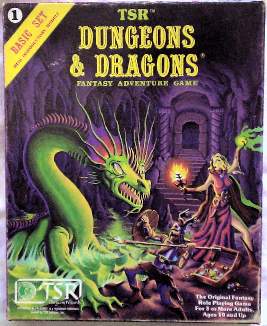Adults, age ten and up

“…for 3 or More Adults, Ages 10 and Up”
I started gaming with the Eric Holmes blue book (in the GM’s hands only), the AD&D Players Handbook, and the Tom Moldvay boxed Basic Set. Because the purple Moldvay box was the first complete version of D&D I owned and read, it is demonstrably superior.
I never even saw the original three OD&D books until years later, after college, when I scored one off of the then-vibrant Usenet gaming groups.
Going over the Holmes and Moldvay versions right now—I keep them in the same box—I noticed something I’d never really paid attention to in the introduction to the two rules sets.
Moldvay box:
The Original Fantasy Role Playing Game for 3 or More Adults, Ages 10 and Up
Dungeons & Dragons® Fantasy Adventure Game (“D&D® Game” for short) is a role playing adventure game for persons 10 years and older.
Holmes blue book1:
The Original Adult Fantasy Role-Playing Game For 3 or More Players
Dungeons & Dragons is a fantastic, exciting and imaginative game of role playing for adults 12 years and up.
Adults 12 and over. Adults 10 and over. There really is a sense in those books that we were entering a world where we had responsibilities, that we were going to take these tools and make our own way at something very new and very much completely under our control. We could do anything, and we had the responsibility that came with such power.
Most of the games of that era, as far as I can tell, didn’t even mention an age range. OD&D, 1st and 2nd edition AD&D, Traveller, don’t seem to have anything about it in their introductions.
I understand the blue book also came in a boxed set, but I do not have it. My understanding is that the cover of the box duplicated the cover of the book itself but in color.
↑
- Holmes Unicorns—Hard to please! at Dragonsfoot
- “The idea that Holmes is aimed at kids is a fallacy that comes from confusing the words ‘beginner’ and ‘child’. It even says on the cover of the rulebook: The Original Adult Fantasy Role-Playing Game’.”
More Dungeons & Dragons
- In Defense of the One-Minute Round
- The six-second combat round de-emphasizes role-playing and problem solving in favor of brute force and pre-defined from-the-sheet actions.
- Critical (fantasy) race theory
- It isn’t racist to address D&D characters by their race. D&D character races are things the character can do. It is racist to imply that real world races are as inferior and superior as fantasy races. Woke racism is still racism.
- Watches in Dungeons and Dragons Fifth Edition
- Watches are actually a bit difficult in D&D 5e due to the sleep/rest rules. Watches with multiple people on each watch, for twice the eyes on target, are even more difficult.
- Surprise and initiative in Advanced Dungeons & Dragons
- For the North Texas Role-Playing Game Convention’s tenth anniversary, I ran an AD&D game; the hardest part was re-figuring out how initiative and surprise work.
- The Great Falling War, Revisited
- Delta’s D&D Hotspot revisits the falling wars, and provides a surprising bit of information about the lethality of falling.
- Six more pages with the topic Dungeons & Dragons, and other related pages
